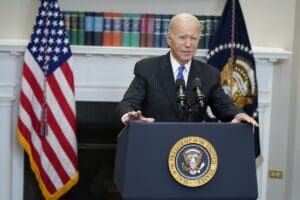Biden administration takes a stand against digital redlining
The practice has deprived minority communities across the U.S. of access to high-speed internet.

The Biden administration is pushing the Federal Communications Commission to adopt rules that would prevent internet providers from deploying high-speed internet service in ways that discriminate against minority communities.
The FCC is currently considering rules that would define digital discrimination and how that definition would apply to the agency’s role in regulating communications services. As part of that process, the FCC is seeking comment from the public and from other government entities.
On Friday, the Department of Commerce’s National Telecommunications and Information Administration made a filing with the FCC in support of strong rules against discrimination.
“Strong rules are needed to remedy unequal access to Internet service, no matter what the cause may be,” Alan Davidson, an assistant secretary of commerce, said in a statement. “Rules that combat digital discrimination will bring lasting relief to vulnerable communities that historically have been left behind online.”
The Commerce Department called on the FCC to adopt rules that would define discrimination not only as intentional policy, but also to include decisions by businesses and institutions that result in broadband disparities even if that was not the intent. Public Knowledge, a nonprofit group that promotes freedom of expression and open internet access, praised the filing.
“Today, the Biden administration takes a strong stand for digital equality for everyone,” Harold Feld, Public Knowledge’s senior vice president, said in a release.
Feld further explained: “As part of its multibillion dollar investment of public money to close the digital divide, Congress ordered the FCC to create rules that will prevent this kind of discrimination and stop broadband providers from engaging in digital redlining. The Biden administration has now thrown its full support behind making sure that all Americans have the same opportunity to participate in our digital future.”
“Digital redlining” is the practice of deploying high speed internet access in a fashion that favors wealthier communities. The activity has been compared to redlining, a term originally used to refer to systemically racist U.S. government decision-making about who would receive federal housing loans based on the racial composition of specific neighborhoods.
A June 2020 study by the Greenlining Institute showed that in Oakland, California, areas lacking faster internet access were more likely to be lower-income communities. The study determined that the most severely affected areas were “in census block groups that combine poverty and a large percentage of Black residents.”
A study by the USC Annenberg Research Network on International Communication published in September 2019 determined that internet service providers in Los Angeles were “cherry-picking” areas for high-speed access deployment and neglecting minority communities.
Similar patterns have been shown in Philadelphia, where Black neighborhoods lack broadband services
Civil rights groups the Leadership Conference on Civil and Human Rights, Asian Americans Advancing Justice, the National Hispanic Media Coalition, National Action Network and the United Church of Christ Media Justice Ministry have called on the FCC to prevent and eliminate digital discrimination.
In addition to the Commerce Department filing, the Biden administration has sought to address disparities in broadband access through a number of policies.
The American Rescue Plan law that President Joe Biden signed in 2021 sent millions of dollars to states to increase broadband access in rural and underserved areas.
That year, Biden also signed the Infrastructure Investment and Jobs Act, which created the Broadband Equity Access and Deployment program, a $42.45 billion grant program to be used to build out or upgrade access in neglected communities.
In June 26 remarks at the White House discussing broadband investments, Biden said: “I promised to be a president for all Americans, whether or not they voted for me or whether or not they voted for these laws. These investments will help all Americans. We’re not going to leave anyone behind.”
Published with permission of The American Independent Foundation.
Recommended

Biden campaign launches new ad focused on Affordable Care Act
Former President Trump has said he wants to do away with the popular health care law.
By Kim Lyons, Pennsylvania Capital-Star - May 08, 2024
Florida abortion ban puts GOP Rep. Anna Paulina Luna’s anti-choice views in spotlight
Luna supports abortions bans with no exceptions for rape
By Jesse Valentine - May 07, 2024
Trump leaves door open to banning medication abortion nationwide
Donald Trump is planning to release more details in the weeks ahead about how his administration would regulate access to medication abortion, according to comments he made during a lengthy interview with Time magazine published Tuesday.
By Jennifer Shutt, States Newsroom - April 30, 2024




































































